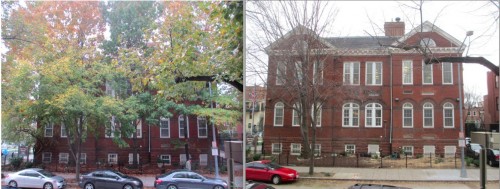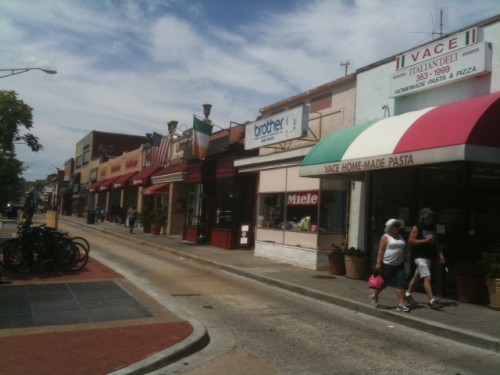
Ed. Note: We previously discussed whether or not the service lane should be converted into a pedestrian boulevard back in 2011.
PoP-Ed. posts may be submitted via email to princeofpetworth(at)gmail please include PoP-Ed. in the subject line.
DDOT proposes to PAVE OVER the safety Service Lane in Cleveland Park:
Honestly, folks, this issue has been abundantly addressed and firmly rejected in the past by the neighbors, merchants, visitors and everyone who values safety from high-speed Conn Ave.
The proponents know well that elderly, disabled, infants, toddlers, and general citizens, be they CP residents or visitors, are safer, at less risk, with less anxiety and fear, and overall more conveniently served by this virtually essential Service Lane.
Safer: because we don’t have to exit a car adjacent to fast moving Connecticut Ave traffic, and likewise at less risk both on foot or in a car because while in the service lane we are protected by the mini-island, small as it is, but so advantageous. Has anyone tried to unload a wheelchair bound passenger from a car at the outside curb lane on Connecticut Ave, with traffic going by? And what about the driver’s safety just opening the door?
More conveniently served: because with nearly 30 parking spaces turning over regularly during the day and evening, and especially as the only source of parking during Rush Hours, what are the proponents of TOTAL PAVE OVER proposing we do if we choose to patronize the merchants during those hours? Read More
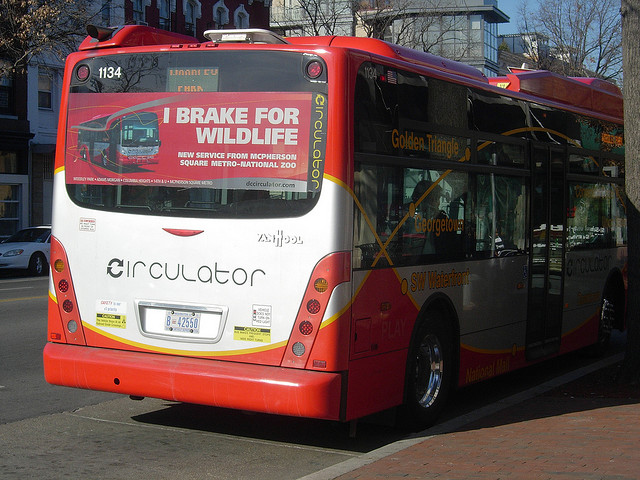
Photo by PoPville flickr user fromcaliw/love
Jenn lives in SE DC in the Capitol Riverfront area. PoP-Ed. posts may be submitted via email to princeofpetworth(at)gmail please include PoP-Ed. in the subject line.
If you’ve lived in or traveled to Washington DC at some point since 2005, you have most likely seen or hopped a ride on a bright red DC Circulator bus.
Having lived on and off in DC circa 1991, I quickly became a Circulator Super Fan when I returned to the District in 2008…the Georgetown and Columbia Heights/14th Street routes becoming my de facto daily transit. When I moved to the still-in-progress Capitol Riverfront/Navy Yard area in 2009, I was ecstatic that the Circulator had made its way here as well.
Fast forward to today and the honeymoon is definitely over, a separation in place, and a potential divorce on the horizon. What went wrong, you ask?
For starters, the friendly and very customer service-oriented drivers on the Navy Yard route are being replaced by rude, entitled, belligerent bullies in uniform. Over the last few months month I’ve personally experienced the following DC Circulator Drivers Behaving Badly scenarios.
In June a DC Circulator bus driver pulled our bus over at the Navy Yard Metro station stop (northside of M Street SE) and walked off the bus with riders still on it so she could chat up her two friends who happened to be walking by. Read More

Joe Mills is a 12 Year Petworth Resident.
Joe is also a neighbor of mine. PoP-Ed. posts may be submitted via email to princeofpetworth(at)gmail please include PoP-Ed. in the subject line.
I moved into Washington DC onto Capitol Hill in ‘88. Moved into Petworth in ‘01 after living in DuPont, Adams Morgan, Mt Plesant and Columbia Heights over the years.
Needless to say I’ve witnessed one or two changes in the city in general and in these neighborhoods in particular.
Closing of Pennsylvania Ave in front of the White House. Opening of G St NW in front of Martin Luther King Jr. library. Barricades and fortifications for the creation of a military base type of enclosure around Capitol Hill. Construction cranes touching the sky all over town. Reaching up out of gigantic deep holes in the ground that spanned the entire city block. Target and TGI Fridays following the lead of Starbucks, and now Wal-Mart finally pushing into the city. Attempting to unleash a massive blow to independent business. I saw these changes but didn’t understand them. At least not until I saw young white girls pushing baby strollers down 14th St where street escorts used make themselves available for Johnny day and night. In this moment I knew why my rent went unchanged for 10 years, then suddenly quadrupled.
What I did not see or predict is what happened to me on April 15, 2013.
Continues after the jump. Read More
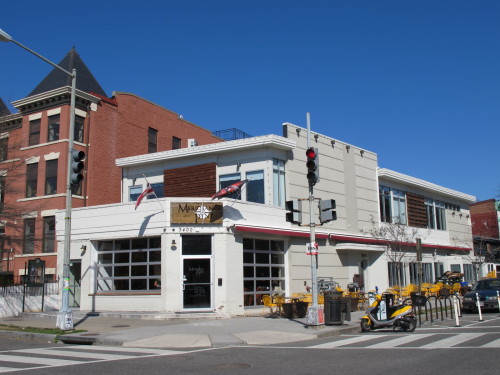
John Andrade is owner of Meridian Pint.
Ed. Note: Meridian Pint is a PoPville advertiser. PoP-Ed. posts may be submitted via email to princeofpetworth(at)gmail please include PoP-Ed. in the subject line.
Clarification, Accountability and a New Direction
Over the past 10 days the topic of Paid Sick Leave for Employees has become a hot button issue in DC politics. Last week, when called by a reporter from DCist, I was asked about my position on paid sick leave for tipped employees. I made the unfortunate mistake of speaking on this topic without being fully aware of this law and most importantly, how my staff truly felt on this topic. I was quoted as saying:
“I do my very best as the principal owner to take care of my staff above and beyond what I would argue is 99 percent of the restaurants in the industry, and I do very well at that. But when it comes to the government mandating that I take care of paying my employees in their absence, whether it be from being sick or emergencies or other issues that may arise, I’m not in favor of the government mandating it.”
I would like to apologize for those that I may have offended, most importantly my staff, but the fact is that I love my community and I love my staff even more. While I am not perfect, I would never expect anyone to work when they are sick or otherwise not able to work. I have always worked with our staff in these situations. I would prefer that staff members take the necessary time to get well. However, despite all my good intentions and great track record with the community, local charities and environmental sustainability, I have fallen short on the most important part of Meridian Pint, my staff. I am sorry to you all.
After reading the quote from another restaurant owner who said “paid sick leave is an expense that he and his counterparts can afford” I realized that he is right. While I believe that many restaurants in DC can barely afford to stay open, much less pay for sick leave, Meridian Pint is a great example of a restaurant that can and should afford to go above and beyond this law. Therefore, as of this week Meridian Pint will now offer paid sick leave to all of its employees including tipped employees.
The truth is, that the ‘Accrued Sick and Safe Leave Act of 2008’ is one of the most important laws that restaurants must abide by yet most of us in the industry are not aware of it and often overlook it. The attention that has been brought to my doorstep this past week has opened my eyes to the seriousness and magnitude of this oversight. I have become the poster child for so many of us in the restaurant industry who overlook the most basic needs and rights of our staff members. Our staff members are the life of our restaurants and without their good health and commitment we would not exist.
I hope that all of my poor decisions up to and including this past week serve as a
wake up call to all my fellow restaurant owners. We cannot drive our businesses forward without taking care of the most important part of our business, our staff.
I would again like to apologize to my staff for overlooking your most important
needs, your health and your income. Moving forward I will promise to always put
you all first above all other concerns. I would also like to apologize to my
community for not following through on my pledge to be the best gathering place in Columbia Heights. I have let you down and for that I am sorry.
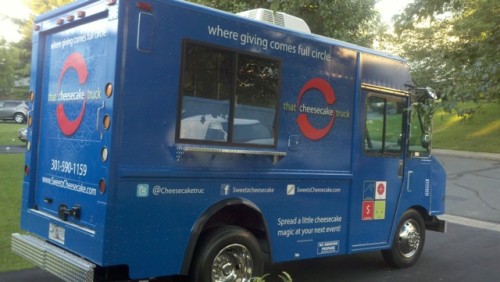
The following PoP-Ed. was written by Craig Barsi. Craig is Co-Owner of Sweetz Cheesecake and That Cheesecake Truck.
PoP-Ed. posts may be submitted via email to princeofpetworth(at)gmail please include PoP-Ed. in the subject line.
Why My Brick-and-Mortar Bakery Opened a Food Truck
It was 1988, and I was working as an accountant in the District and knew there had to be something more fulfilling than what I was doing. My love has always been food – especially sweets – so I knew this was the direction to go. My wife and I raided our savings accounts, and with the generosity of family, the Sweetz Cheesecake bakery was born.
Those first few years we spent peddling our cakes to Washington area restaurants and hotels. Our business grew, and in 1992 we opened our retail shop in Gaithersburg, Maryland. In 2000 we added a fundraising component to our business and have been steadily helping schools and nonprofits since.
When I started to look to expand or possibly move our bakery to the District, the high-priced rent, steep fees and bureaucracy gave me pause. Taking risks is part of any business, but I had to wonder if in this case it was worth it given that we were happily operating where we were.
However, the idea of a food truck captured my attention. Imagine being able to roam around a city and develop a clientele neighborhood by neighborhood. It wasn’t until 2011 when I brought my son-in-law on as a partner that I had the trusted manpower and energy that I needed! That Cheesecake Truck was born. Today “Big Blue” serves hundreds of cheesecakes across the District every week. That Cheesecake Truck also gives 10 percent of sales to charities we believe in. This is a sacrifice for us, as it would be for any food establishment, but we do it because this city has given me the ability to raise a family and build a business that one day I will pass along to them.
For my business, our food truck provided a way to test the market and build a brand and customer base, and it has convinced me that we could open a successful brick-and-mortar store in the District.
I’m one of a growing number of Food Truck Association of Metropolitan Washington members who started as brick-and-mortar businesses then opened a food truck. Like my colleagues who started as food trucks then grew into brick-and-mortar restaurants, I believe that regulations that stifle entrepreneurship and put at risk hundreds of jobs are not just bad for food trucks, they’re bad for all small businesses.
If Mayor Vincent Gray’s proposed regulations for food trucks are adopted, they would force us into a limited number of lottery-assigned spaces in the most popular areas, ban food trucks from operating within 500 feet of those spaces and prohibit downtown vending where there is less than 10 feet of unobstructed sidewalk.
Continues after the jump. Read More
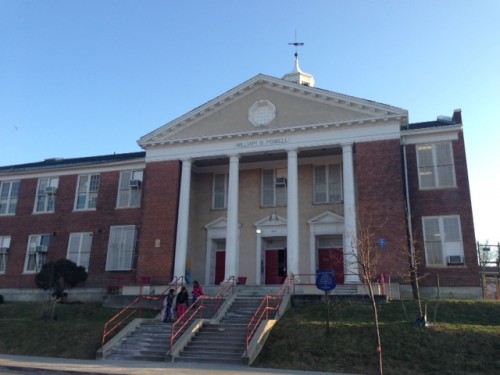
1350 Upshur Street, NW
The following PoP-Ed. was written by Jonathan O’Connell, a Petworth dad.
PoP-Ed. posts may be submitted via email to princeofpetworth(at)gmail please include PoP-Ed. in the subject line.
Since it’s time for D.C. parents to make their school lottery and charter choices I wanted to point out that one of the most underrated DCPS elementary schools, particularly for preschoolers, is in Petworth — Powell Elementary.
Obviously I am biased because my three-year-old goes there, but having toured 10-15 DCPS, charter and private schools (and having used nanny shares and private day cares) I seriously believe believe Powell is one of the best preschool options around. The principal, Janeece Docal, is an absolute force of nature. The preschool and pre-K teaching team has been together a few years and was one of the earliest in the city to adopt the Tools of the Mind curriculum (sort of Montessori light) that is now spreading all over the place. They are incredibly responsive, thoughtful and thorough. I would be happy having my kids literally in any of the classrooms.
Here’s what preschool and pre-K students at Powell get: Instruction from two teachers, in English and Spanish. Recess every day. Separate art, music, library and gym classes. And field trips: In five months at the school my daughter’s class has made pizza at Pete’s Apizza, visited the Botanical Gardens and talked food and shopping at Yes Organic Market. They bring in a yoga instructor some days.
I think a lot of middle class parents are turned off by Powell for two reasons: 1) data and 2) the look of the building. I love data so have been through it and the test scores are bad compared to a lot of suburban schools. I understand. But Docal is a turnaround agent and the students that have had her the entire time aren’t even out of first grade yet. There’s a reason the private foundation Fight for Children made Powell its only DCPS awardee last year.
The building needs upgrades but is on the list for school modernization and expansion for which there is now a petition. Powell already has one of the most important things I wanted, which was a bathroom for each PS/PK room with its own toddler-sized toilet so the kids don’t have to go in the hallways with the big kids. It’s not dated open classroom format. Plus, it’s across the street from Upshur Park — tons of green space.
Why I am writing this? First, I just can’t believe the disconnect between what I’ve experienced at Powell and what people say about schools east of the park (and what is in the School Chooser). Annoying. Am I certain my kids will go all the way through Powell? No. There is a lot of improvement to be made in the upper grades. And Principal Docal could leave, which would be the worst. But I really couldn’t ask much more from my neighborhood preschool program.
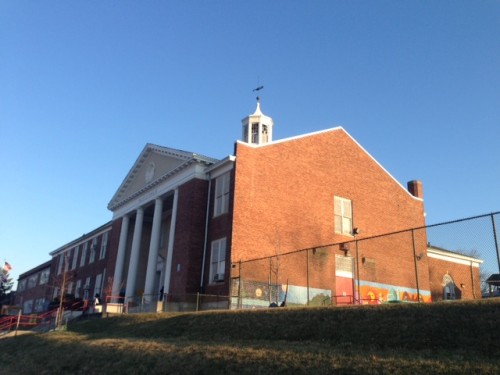
The following PoP-Ed. was written by Charles A. Birnbaum and Nord R. Wennerstrom. PoP-Ed. posts may be submitted via email to princeofpetworth(at)gmail please include PoP-Ed. in the subject line.
At DC’s Department of General Services – why use microsurgery when there’s amputation?
This is a classic “right hand not knowing what the left hand is doing” – and the result disfigured a neighborhood. Mayor Gray, with the assistance of Casey Trees, is committed to increasing DC’s overall tree canopy to 40% by 2035. That’s a shared goal with a shared effort and requires adherence by city officials and DC residents alike. The DC Department of Transportation’s Urban Forestry Administration is the municipal agency in charge of this effort everywhere except on public school property – that’s the domain of the Department of General Services. Unfortunately, based on what recently occurred on the Ross Elementary School’s grounds at 1730 R Street, NW, DGS doesn’t care whether they needlessly eradicate large canopy trees.
Here’s what happened: early on New Year’s Eve day (note the timing), and without any prior public notice, several employees from the Andersen Tree Expert Co., contractors hired by DGS, began cutting down virtually every tree in front of Ross. Before the clear cutting could be temporarily halted, three of four large oaks – among the largest trees on the block – and a crabapple were cut down. One of the oaks was heaving out of the ground and had to go (it’s arterial roots likely severed during the school’s renovation this past summer – something we want an objective, third-party arborist to determine), but the remaining trees were perfectly healthy.
Continues after the jump. Read More
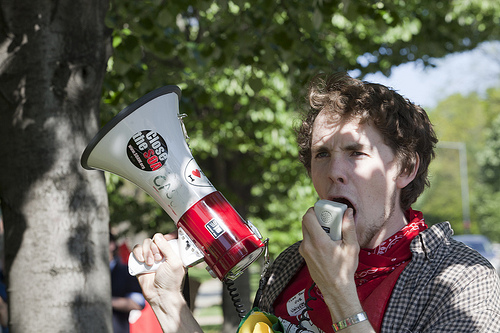
Photo by PoPville flickr user Eric Spiegel
The following PoP-Ed. was written by Josh Freed, Jennifer Leonard, Cindy Balmuth, and Dina Dajani, parents of students at of Hearst Elementary School. PoP-Ed. posts may be submitted via email to princeofpetworth(at)gmail please include PoP-Ed. in the subject line.
Why the Wait to Modernize DC’s Aging Schools?
By Josh Freed, Jennifer Leonard, Cindy Balmuth, and Dina Dajani
Last week, the parents of Hearst Elementary, a public school in Ward 3 that serves children from across every ward in the city, invited Mayor Gray to visit our school on Friday, December 21st. We hope to show the Mayor, first-hand, how insufficient funding for our long-overdue renovation and expansion is sentencing our students to facilities that fail to meet basic educational standards. This has been a problem the City has identified in its own internal planning documents dating back to 2008.
Hearst was built in 1930 and essentially remains a Depression-era schoolhouse today. It is the educational home to 280 kids, ages 4 to 10. Half of these students are housed in trailers, most without running water or bathrooms. Hearst has no cafeteria, gym or central meeting space. Students as young as six must carry trays of food up stairs to their classroom and have no choice but sit on the floor to eat their lunch. And despite having an excellent autism program, there is no space to provide therapies for students in need.
According to the DC government, it will require only $22 million to bring Hearst up to minimum 21st century standards. Yet, the city has only allocated $9 million.
Without an additional $13 million, our students will remain spread out across an antiquated main building and several sets of trailers, continue to eat at their desks and on hallway floors, and receive therapies in hallways. They’ll miss out on the critical benefits that common instructional and physical spaces provide and modern educational specifications demand. It also means that children and cars will continue to co-exist in a dangerous driveway; and that access will remain difficult to manage.
This is not about geography – Hearst represents families from every City ward. It is not about an underperforming or under-enrolled school — Hearst is a high achiever and 100% over capacity. This cannot be about priorities – Mayor Gray has championed special needs and early education throughout his career. It should not be about poor planning – the City developed Master Plans in 2008 and 2010 and updated Education Specifications in December 2011, when District officials launched their consultative planning process with the community.
Nevertheless, Hearst students are poised to be victims of City bureaucracy twice. First, due to a defective budget and planning system that failed to accurately account for dramatic increases in student population and classes. Then, and despite administration assurances and a paper trail, due to a funding roadblock that risks more delay.
We hope Mayor Gray comes to see for himself the dichotomy between the quality of students and the compromising circumstances imposed upon them by the District. And we hope that other residents of the District, who want to see their children or their friends and neighbors’ children succeed and the City remain a vibrant place for residents of all ages, will urge the Mayor to fund modernization so that all schools are built for the 21st century.

Photo by PoPville flickr user Eric Spiegel
The following PoP-Ed. was written by Mark Lee, Coordinator, D.C. Hospitality. PoP-Ed. posts may be submitted via email to princeofpetworth(at)gmail please include PoP-Ed. in the subject line.
“The fringe element should be taken out of the process.”
— D.C. Chef/Restaurateur Jamie Leeds, describing 7-year-long battle waged by only 5 liquor license protestors against her popular Hank’s Oyster Bar (The Current Newspapers, July 25, 2012)
Residents all over the city and local area patrons are frustrated by what’s been happening. As neighborhoods grow and residents hope for new social amenities, independent community businesses confront obstinate obstruction by small groups directly intervening in the licensing process. Now is the time to support alcohol licensing reform!
It’s time to end an out-of-balance licensing system that puts limits on dining, drinking and entertainment choices for the many by the few – slowing the city’s forward progress and hurting the local economy!
FORWARD…or…FRINGE? That’s the question facing D.C. Councilmembers beginning next week.
Small and unrepresentative groups continue to hold new and existing D.C. hospitality and nightlife venues hostage. They manipulate the liquor licensing process to coerce community small businesses into special restrictions inconsistent with city operating regulations.
The D.C. Council is currently considering changes to fix the system. They know that repairs to the law are required — but they need to hear from residents and local area patrons urging them to make meaningful reforms that offer real solutions.
A vibrant modern city needs new rules for a fair and transparent process. Reforms that take away the power of ad hoc groups of only 5 people (“Gangs of 5”) and small citizens associations claiming to speak for all. Solutions that stop these groups from causing long licensing delays and huge financial losses so they can impose special operating limits.
Real reforms will repair the system. Fairness will fix the law:
— Let all voices be heard. End the unfair license protest powers of small groups and self-proclaimed citizens associations. Use the open forum of the elected Advisory Neighborhood Commission (ANC) for community discussion and any decision to offer an advisory opinion to the D.C. Alcoholic Beverage Control (ABC) Board.
— Ensure city law regulates businesses equally citywide. Stop ANCs from creating their own special rules, restrictions and operating limits on their “turf” for hypothetical problems before a business has even opened. Equal enjoyment for all consumers and a level playing field for all businesses is the only common-sense solution.
— Give optional licensing agreements a new name. Change so-called “Voluntary” Agreements to “Settlement” Agreements to make clear they are not required for licensing approval and to reflect their intended optional use for resolving real issues.
— End lengthy and unnecessary licensing delays. Guarantee that the ABC license process is expedited in a timely manner. Make the steps more efficient and establish statutory timeframes (not just “guidelines”). This will prevent abuse of the system to threaten delays and force unpopular operating restrictions. The law should require a license decision on an orderly and predictable schedule.
It’s time to stop the ability of the few to speak for the majority — the tiny groups abusing the system and forcing unpopular restrictions on community establishments.
Hospitality businesses build neighborhoods, enliven our shared lives, and fuel the local economy. It’s time for all of us to return the favor and tell D.C. Councilmembers and Mayor Gray to finally fix the system and reform the rules.
Fairness supporters are going online at http://DCHospitality.org to add their voices in a grassroots community effort urging reform of hospitality and nightlife licensing regulations!

Photo by PoPville flickr user ekelly80
As owners of three DC brick-and-mortar restaurants, we oppose Mayor Gray’s proposals to limit food trucks in the most popular locations in the city. These proposed regulations create vague rules where there is less than 10 feet of “unobstructed” sidewalk and give the Department of Transportation new powers to determine where food trucks can and cannot operate.
These proposals do little to satisfy the administration’s desire to manage public space and threaten to push out food trucks from large areas of downtown. Mayor Gray’s proposal would stifle entrepreneurship and put at risk the hundreds of jobs food trucks create.
As entrepreneurs, we oppose any policy that threatens the livelihood of small businesses — brick-and-mortar or mobile. But there’s an additional reason why Mayor Gray’s proposal troubles us. We are not only restaurant owners; we are also the owner-operators of three of DC’s first food trucks.
When we first set out to open our restaurants a few short years ago, it was the height of one of the worst recessions in history. Credit and investment money had dried up, and no banks were lending the +$500,000 needed to open a brick-and-mortar restaurant. We cobbled together — from family, friends and savings — enough to open the next best thing: a food truck.
It turned out to be a smart move. Our food trucks enabled us to master the ins and outs of the food service business. We were able to test whether or not we really were up for the 24-7 work life of a small business owner. And when we returned to the banks for restaurant financing lenders counted our food trucks as collateral, tallied our Twitter followers as ready customers and saw successful businesses worth investing in.
Our food trucks are what made our brick-and-mortar restaurants possible.
We shouldn’t be the last food truck owner-operators to open restaurants in DC. When we started our food trucks it was just us on board the trucks; as we grew we hired a handful of employees; now our restaurants employ dozens of District residents.
However, if Mayor Gray’s proposal was adopted there would certainly be far fewer food truck owner-operators opening restaurants in the District. Or we may find a growing number of us hanging our shingle in the more business friendly communities just outside the District’s borders.
Stephan Boillon, Owner, El Floridano food truck and Mothership restaurant
Roger Horotwitz and Brian Sykora, Owners, Pleasant Pops food truck and Pleasant Pops Farmhouse Market & Café
Trent Allen and Josh Saltzman, Owners, PORC food truck and Kangaroo Boxing Club restaurant
After the jump read more details from the Food Truck Association: Read More


